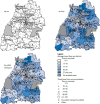Monitoring the health and healthcare provision for refugees in collective accommodation centres: Results of the population-based survey RESPOND
- PMID: 35146304
- PMCID: PMC8734199
- DOI: 10.25646/7863
Monitoring the health and healthcare provision for refugees in collective accommodation centres: Results of the population-based survey RESPOND
Abstract
To date, the integration of refugees in German health surveys is insufficient. The survey RESPOND (Improving regional health system responses to the challenges of forced migration) aimed to collect valid epidemiological data on refugee health status and healthcare provision. The core elements of the survey consisted of a population-based sampling procedure in Baden-Württemberg, multilingual questionnaires and a face-to-face approach of recruitment and data collection in collective accommodation centres with multilingual field teams. In addition, data on the geographical locations of accommodation centres and their structural quality were obtained. The results indicate a high overall health burden. The prevalence of depression (44.3%) and anxiety symptoms (43.0%) was high. At the same time, high unmet needs were reported for primary (30.5%) and specialist (30.9%) care. Despite sufficient geographical accessibility of primary care services, frequent ambulatory care sensitive hospitalisations, i.e. hospitalisations that could potentially have been avoided through primary care (25.3%), as well as subjective deficits in the quality of care, suggest barriers to accessing healthcare services. Almost half of all refugees (45.3%) live in accommodation facilities of poor structural quality. Collecting valid data on the health situation of refugees is possible through a combination of targeted sampling, multilingual recruitment and survey instruments as well as personal recruitment. The presented approach could complement established procedures for conducting health surveys and be extended to other federal states.
Keywords: ACCESS BARRIERS; HEALTH MONITORING; QUALITY OF CARE; REFUGEES; SURVEY.
© Robert Koch Institute. All rights reserved unless explicitly granted.
Conflict of interest statement
Conflicts of interest The authors declared no conflicts of interest.
Figures






Similar articles
-
Health monitoring among asylum seekers and refugees: a state-wide, cross-sectional, population-based study in Germany.Emerg Themes Epidemiol. 2019 Jul 7;16:3. doi: 10.1186/s12982-019-0085-2. eCollection 2019. Emerg Themes Epidemiol. 2019. PMID: 31316579 Free PMC article.
-
Type of Refugee Accommodation and Health of Residents: A Cross-Sectional, Population-Based Cluster Analysis in South-West Germany.Int J Public Health. 2023 Sep 6;68:1605786. doi: 10.3389/ijph.2023.1605786. eCollection 2023. Int J Public Health. 2023. PMID: 37736387 Free PMC article.
-
Utilisation of dental services by refugees in Germany: Results of the population-based RESPOND survey.J Health Monit. 2024 Jan 17;9(Suppl 1):2-10. doi: 10.25646/11844. eCollection 2024 Jan. J Health Monit. 2024. PMID: 38282983 Free PMC article.
-
A model explaining refugee experiences of the Australian healthcare system: a systematic review of refugee perceptions.BMC Int Health Hum Rights. 2019 Jul 18;19(1):22. doi: 10.1186/s12914-019-0206-6. BMC Int Health Hum Rights. 2019. PMID: 31319819 Free PMC article.
-
Barriers and facilitators to dental care access among asylum seekers and refugees in highly developed countries: a systematic review.BMC Oral Health. 2020 Nov 25;20(1):337. doi: 10.1186/s12903-020-01321-1. BMC Oral Health. 2020. PMID: 33238954 Free PMC article.
Cited by
-
Exploring contextual effects of post-migration housing environment on mental health of asylum seekers and refugees: A cross-sectional, population-based, multi-level analysis in a German federal state.PLOS Glob Public Health. 2023 Dec 27;3(12):e0001755. doi: 10.1371/journal.pgph.0001755. eCollection 2023. PLOS Glob Public Health. 2023. PMID: 38150435 Free PMC article.
-
Health of people with selected citizenships: results of the study GEDA Fokus.J Health Monit. 2023 Mar 21;8(1):7-33. doi: 10.25646/11143. eCollection 2023 Mar. J Health Monit. 2023. PMID: 37064418 Free PMC article.
-
[Determinants of asylum seekers' health and medical care in Germany].Bundesgesundheitsblatt Gesundheitsforschung Gesundheitsschutz. 2023 Oct;66(10):1083-1091. doi: 10.1007/s00103-023-03762-9. Epub 2023 Sep 14. Bundesgesundheitsblatt Gesundheitsforschung Gesundheitsschutz. 2023. PMID: 37707509 Free PMC article. Review. German.
-
Access to medicines among asylum seekers, refugees and undocumented migrants across the migratory cycle in Europe: a scoping review.BMJ Glob Health. 2024 Oct 15;9(10):e015790. doi: 10.1136/bmjgh-2024-015790. BMJ Glob Health. 2024. PMID: 39414330 Free PMC article.
-
Effect of area-level socioeconomic deprivation on mental and physical health: A longitudinal natural experiment among refugees in Germany.SSM Popul Health. 2024 Jan 2;25:101596. doi: 10.1016/j.ssmph.2023.101596. eCollection 2024 Mar. SSM Popul Health. 2024. PMID: 38304416 Free PMC article.
References
-
- Bradby H, Humphris R, Newall D, et al. (2015) Public health aspects of migrant health: a review of the evidence on health status for refugees and asylum seekers in the European Region. WHO HEN synthesis report 44. WHO Regional Office for Europe, Denmark - PubMed
LinkOut - more resources
Full Text Sources
Research Materials
